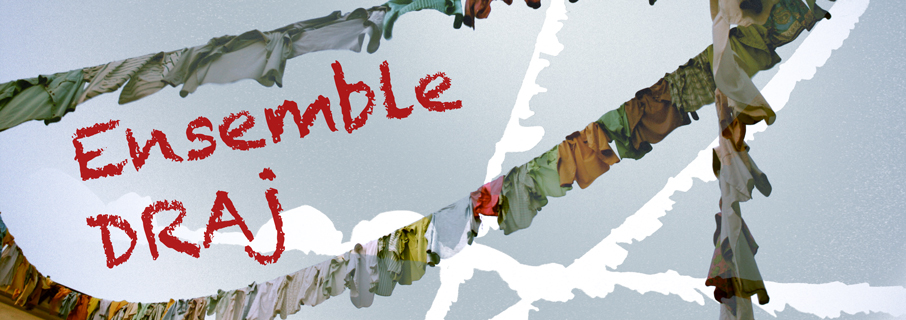CD-Kritiken Lieder aus den Ghettos
Eine echte Entdeckung ist das Ensemble DRAj: Gesang, Cello, Akkordeon - sonst nichts. Ein nahezu unbekanntes Trio. Sie haben eine CD herausgebracht, die eine ganz eigenständige Herangehensweise reflektiert: brillante Arrangements, in denen sich selbst bekannte Lieder neu erfahren lassen, kühne Harmonien, ein inspirierter Zusammenklang der drei Instrumente. Eine kleine Produktion, die den Raum für das jiddische Lied öffnet. (Birger Gesthuisen in: Jazz 'n World Trends, WDR 5, 9. November 2000)
Das Ensemble DRAj präsentiert die ausdrucksvoll zwischen Trauer und Zuversicht changierenden Melodien und Texte der jiddischen Lieder dabei in gelungenen eigenen Arrangements, die immer wieder auch Freiraum für kurze Improvisationen bieten. (Gregor Wilmes in: FonoForum 8/2000)
Ihre CD hat mir sehr gut gefallen ... (Paul Spiegel, Präsident des Zentralrates der Juden in Deutschland)
Ensemble DRAj is composed of three German musicians and this CD features songs from the Yiddish literature. Some express hope and the joy of life contemporaneously with mourning and despair, as sung in Warsaw and Vilna ghettos as well as in the German concentration camps.
The trio, which have training in stylistically diverse camps: Kaupenjohann and Schmidt certainly have classical and jazz training, while Kruger seems to excel in popular music, yet I believe the combination gives the songs a new (and authentic) expressivity.
Don't think for a moment that Ensemble DRAj is an ordinary trio of nightclub musicians. They are experienced chamber musicians; and this album is chamber music of a high quality. The musical arrangements are very interesting to listen to and reveal the group's high standards of musicianship.
The combination of alto voice, accordion and cello is dynamic and very pleasing to the ear. Sometimes Schmidt treats his instrument like a pizzicato double bass and sometimes like an arco violin. The accordion in Kaupenjohann's hands is always tasteful and never overbearing. It is very important in an ensemble that the accordionist does not tire the listeners by constantly featuring his instrument in the limelight. No, Kaupenjohann has extremely fine taste, and knows how to keep a satisfying balance between members of the ensemble.
This album is not a virtuoso showcase, but it is a moving tribute to those courageous souls who have suffered greatly at the hands of their tormentors. The CD booklet notes are written in German and English. The songs are printed in Yiddish and German (Henry Doktorski (USA) auf der Seite: "The Free-Reed Review" July 2001)
From Germany, The Ensemble DRAj brings us "Lieder aus den Ghettos" (Songs from the Ghettos), well-sung renditions of Jewish songs from the Holocaust. Singer Anette Krüger's voice is quite nice, and the backing by accordion and cello is slightly jazzy and very well-done. Although, perhaps overshadowed by recent albums such as the outstanding collaboration between Adrienne Cooper and Zalmen Mlotek, "Ghetto Tango", that have built on this material and added much, this album is still quite a pleasant fusion between Weillish cabaret, Jewish folk melody, and jazz. What I can't answer is whether or not we are far enough from the Holocaust that such material can be presented by in a non-Jewish, German context, as here, and reasonably be reviewed on the basis of how it sounds. (Ari Davidow auf der Seite: "KlezmerShack" 12. November 2000)

